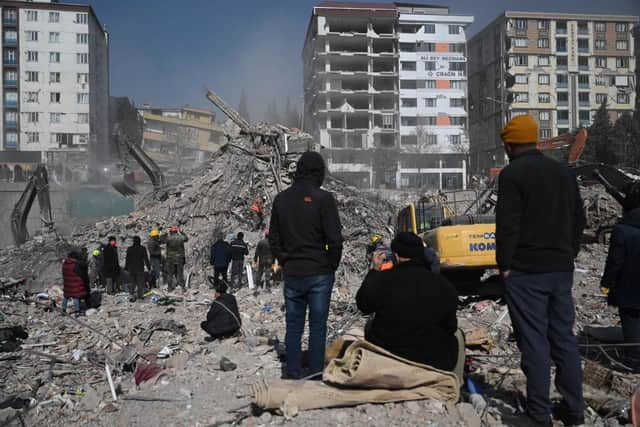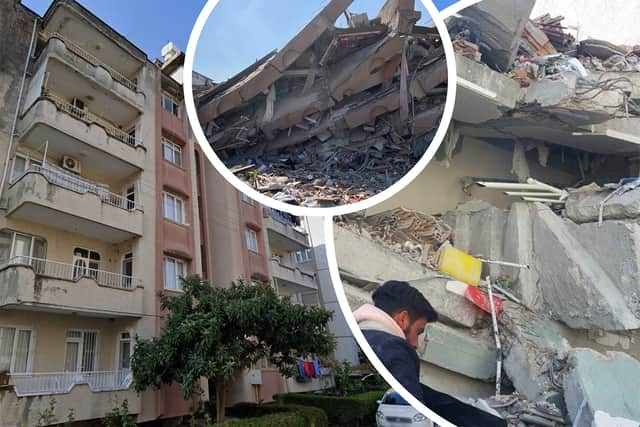Turkey earthquakes: why did thousands of buildings collapse and why are contractors being arrested?
and live on Freeview channel 276
A week after a pair of deadly earthquakes caused mass casualties and devastation in Turkey, the search for answers as to why thousands of buildings - some newly built - slumped sideways or crumpled downwards has begun.
More than 35,000 people have been reported dead after two massive earthquakes hit Turkey and Syria last week. The US Geological Survey measured the first quake at magnitude 7.8, with a depth of 11 miles. Hours later a magnitude 7.5 tremor, likely triggered by the first, struck more than 60 miles away.
Advertisement
Hide AdAdvertisement
Hide AdTurkish environment and urbanisation minister Murat Kurum said over 41,500 buildings had either been destroyed, or were so damaged they would have to be demolished, and there were more bodies still to be recovered under those buildings.
Many in Turkey are blaming poor enforcement of construction rules for the vast destruction the country has suffered. Authorities, on the other hand, have been targeting contractors allegedly linked with buildings that collapsed.
Why did so many buildings in Turkey collapse after the earthquake?
Turkey is no stranger to earthquakes and there are construction codes in place that meet current earthquake engineering standards, but some experts say the laws have been poorly enforced.
David Alexander, an emergency planning and management expert at University College London, told the BBC it was likely most of the buildings that collapsed did not stand up to reasonably expected earthquake construction code.


Advertisement
Hide AdAdvertisement
Hide Ad"In part, the problem is that there’s very little retrofitting of existing buildings, but there’s also very little enforcement of building standards on new builds," he said. A BBC Middle East correspondent spoke to people in the southern city of Adana, who said one collapsed building there was damaged 25 years ago in another earthquake, but had been left without any proper earthquake safety retrofitting since.
Aston University civil engineering lecturer Haris Alexakis told NationalWorld that poor implementation of seismic codes and inadequate quality control in construction were often why modern buildings “completely crumple within the first seconds of a strong ground shaking”.
“Designing all buildings to remain intact under seismic events on a huge scale is financially impractical,” he said. “However, by following the seismic design and retrofitting principles of modern seismic codes, earthquake-resistant structures are expected to suffer limited or repairable damages in moderate earthquakes, help protect lives and are less likely to collapse in a rare seismic event.”
Alexakis said what happened in Turkey and Syria was a global concern. “Collapse of buildings and supporting infrastructure - such as bridges - are common even in non-seismic areas or highly developed countries, and will become more common as the built environment ages and we do not do enough to enhance the longevity of our structures.”


Why have some building contractors been arrested?
Advertisement
Hide AdAdvertisement
Hide AdDespite the power of the quakes, many victims and experts alike in Turkey blame faulty construction for compounding the devastation.
On Saturday (11 February), Turkish vice president Fuat Oktay said warrants had been issued for 131 people suspected of being responsible for buildings that failed to withstand the quakes.
Turkey’s Justice Ministry announced plans to establish an “Earthquake Crimes Investigation’’ bureau. Its purpose will be to identify contractors and others responsible for building works, gather evidence, instruct experts including architects, geologists and engineers, and check building and occupation permits.
Meanwhile, justice minister Bekir Bozdag has vowed to punish anyone responsible, and prosecutors have begun gathering samples of buildings for evidence on materials used in construction.
Advertisement
Hide AdAdvertisement
Hide AdOn Sunday (12 February), authorities in the province of Gaziantep arrested two people who are suspected of having cut down columns to make extra room in a building that collapsed, the state-run Anadolu Agency said.
A building contractor was also detained by authorities at Istanbul airport on Friday (10 February) before he could board a flight out of the country. He was the contractor behind a luxury 12-storey building in Antakya, in Hatay province, which collapsed and left a number of occupants dead.
Why is there anger at the Turkish government?
Some have argued the investigation is an attempt to deflect anger and blame from officials, ahead of the upcoming parliamentary and presidential elections in May.
As well as alleged poor enforcement of building codes, The Times reports that since it was founded in the 1920s, Turkey has issued 23 “reconstruction pardon” windows. Over a third of those have been issued since current president Recep Tayyip Erdogan took power in 2003.
Advertisement
Hide AdAdvertisement
Hide AdHuge numbers of illegally built, unlicensed structures were pardoned by the state after paying a fee, with 7.5 million buildings benefitting from the latest construction pardon - issued in 2018 before the last parliamentary elections.
According to 2020 data from the Environment and Urban Ministry, about half of the buildings in Turkey were built in violation of earthquake safety regulations, The Times says.
The BBC reports there is also ongoing uncertainty around what happened to a large sum of money collected through two "earthquake solidarity taxes" created after the country’s deadly 1999 quakes. The funds were meant to make buildings resistant to earthquakes.
One of the taxes is paid to this day by mobile phone operators, radio and TV, and has brought about 88 billion lira (£3.8 billion) into state coffers. The tax was even increased to 10% two years ago, but the government has never fully explained where the money has been spent.
Comment Guidelines
National World encourages reader discussion on our stories. User feedback, insights and back-and-forth exchanges add a rich layer of context to reporting. Please review our Community Guidelines before commenting.
